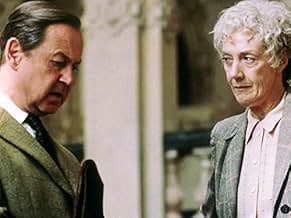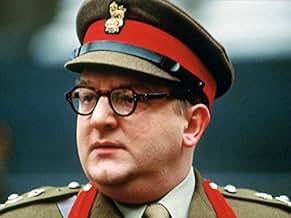CALIFICACIÓN DE IMDb
7.5/10
566
TU CALIFICACIÓN
La secuencia de doce volúmenes de la novela de Anthony Powell «A Dance to the Music of Time» ha sido dramatizada para la televisión.La secuencia de doce volúmenes de la novela de Anthony Powell «A Dance to the Music of Time» ha sido dramatizada para la televisión.La secuencia de doce volúmenes de la novela de Anthony Powell «A Dance to the Music of Time» ha sido dramatizada para la televisión.
- Ganó 1 premio BAFTA
- 3 premios ganados y 5 nominaciones en total
Explorar episodios
Opiniones destacadas
I have to disagree with Mary Smith from America who said that this series was better than Brideshead Revisited. A Dance to the Music of time is almost completely devoid of any charismatic or otherwise engaging characters, with the exception of the likeable Stringham and the repulsive Widmerpool. It gestures towards Brideshead far too obviously (perhaps this was inevitable given the subject matter and the era) and in a way that only demonstrates its relative inferiority. The dialogue and direction are far too stagey, with the result that the character's words just don't ring true. Moreover I felt no concern for any of the characters: they wander aimlessly through their lives and we are offered nothing more than disconnected snapshots to develop our interest. There seems to be no analysis of or motivation for any of their actions: one character kisses another, some people get married, some divorce and some die. There is little by way of analysis: we "see" a lot, but understand (or care for) little of what goes on.
I confess that I enjoyed this series in parts. The costumes really are very good and the better actors do try valiantly with this stilted and sterile script. But it really is almost embarrassing compared to the infinitely superior Brideshead. Apart from a few entertaining scenes involving people dying at parties, and a rather enthusiastic display of nudity in the early scenes, this mini-series is really only for those who have read the books, and even then only as a curiosity piece.
Perhaps I have come to expect too much of British mini-series after being spoilt by productions such as Brideshead Revisited, Martin Chuzzlewit and Pride and Prejudice. Nonetheless, A Dance to the Music of Time is a barely entertaining, wasted opportunity.
I confess that I enjoyed this series in parts. The costumes really are very good and the better actors do try valiantly with this stilted and sterile script. But it really is almost embarrassing compared to the infinitely superior Brideshead. Apart from a few entertaining scenes involving people dying at parties, and a rather enthusiastic display of nudity in the early scenes, this mini-series is really only for those who have read the books, and even then only as a curiosity piece.
Perhaps I have come to expect too much of British mini-series after being spoilt by productions such as Brideshead Revisited, Martin Chuzzlewit and Pride and Prejudice. Nonetheless, A Dance to the Music of Time is a barely entertaining, wasted opportunity.
This was an adaptation that was almost bound to fail. Squeezing 12 novels into eight hours of television allows just 40 minutes per novel. 'The Valley of Bones' was condensed into just 17 minutes. If this had been done well it would truly have been a miracle of compression. However, it was achieved by eliminating about two-thirds of the book.
So it is really rather surprising that the adaptors should have created scenes which were only hinted at rather than described in the book. I counted four, all of which added unnecessary violence and gore. I think if Powell had wanted to make these scenes explicit he would have done so - but he preferred for them to happen offstage.
What is also hard to forgive was the decision to play fast and loose with the chronology towards the end of the series. For example, the launch of 'Fission' should have been immediately after the end of the war rather than somewhere in the mid 50s, while the award of the Magnus Donners prize took place in 1968 or 9 rather than 1963. Anyone who has any feel at all for the period would know that the difference is immense.
But there are good things about this too. The casting is excellent with no-one out of place; the atmosphere for the most part convincing and compelling. A pity that the cast did not have the chance to work through a real adaptation, rather than this drastic and unsatisfactory abridgement.
So it is really rather surprising that the adaptors should have created scenes which were only hinted at rather than described in the book. I counted four, all of which added unnecessary violence and gore. I think if Powell had wanted to make these scenes explicit he would have done so - but he preferred for them to happen offstage.
What is also hard to forgive was the decision to play fast and loose with the chronology towards the end of the series. For example, the launch of 'Fission' should have been immediately after the end of the war rather than somewhere in the mid 50s, while the award of the Magnus Donners prize took place in 1968 or 9 rather than 1963. Anyone who has any feel at all for the period would know that the difference is immense.
But there are good things about this too. The casting is excellent with no-one out of place; the atmosphere for the most part convincing and compelling. A pity that the cast did not have the chance to work through a real adaptation, rather than this drastic and unsatisfactory abridgement.
It's possibly a bit late to post this question but as I have only now managed to see the video, here goes anyway. Does anyone know WHY it was deemed necessary to replace James Purefoy and Emma Fielding as Nicholas Jenkins and his wife in the last film of the series? Most of the other characters were left to age, convincingly or otherwise, even Widmerpool himself. Though Joanna David did at least bear a tolerable resemblance to how Isobel (Fielding) might have looked in later life, John Standing, excellent actor though he is, didn't look remotely like an aged James Purefoy. The changeover broke the continuum of events for me and was a constant source of irritation. What was behind this strange, irrational decision?
Hands down, this is the best miniseries or film that I have ever seen. Everything about this miniseries was my cup of tea: the clothes, the scenery, the dialogue, the many handsome actors, just everything. I had broken down and bought myself one of those PAL video players as so many video tapes that I wanted to see were only available in PAL format. As an American NTSC videotape user, it was hard for me to reconcile the purchase of the special PAL VCR, until I saw this miniseries in all its glory. What an absolute confection! I wanted to be a part of the story. I find it hard to believe that this miniseries is not available to the American market in NTSC format. This miniseries far surpasses Brideshead Revisited, among others. Although Simon Russell Beal certainly did a phenomenal acting job, I also thought James Purefoy displayed alot of range and depth particularly in the difficult role of an observer narrator. I really can't say enough about how marvelous this miniseries was! It was worth every penny spent to see this miniseries!
At long last, Anthony Powell's 12 volume novel sequence A Dance to the Music of Time has been dramatised for television. If Powell's "Journals" are to be believed, this is after any number of false starts spanning the best part of 20 years. The dramatisation was in four two-hour episodes, each covering approximately 3 books. They were shown on UK's Channel 4 TV in October 1997. The format of four 2-hour films was, in many ways, unfortunate as it severely constrained the amount of the action which could be shown, however given the exigencies of modern TV scheduling it was probably the only way in which "Dance" was ever going to get televised. As a devotee of the books, I was apprehensive about how they would translate into film. Just how do you condense 12 novels into 8 hours of television? However in my view the dramatisation worked extremely well, notwithstanding the necessary omissions. What helped the whole production was some interesting, and at times inspired and doubtless extravagant, casting which included: Edward Fox (as Uncle Giles), Zoë Wanamaker (as Audrey Maclintick), John Gielgud (as St John Clarke), Alan Bennett (as Sillery), Miranda Richardson (as Pamela Flitton)... some interesting choices!! Overall an interesting and enjoyable series. I just fear that having been done once that we'll never see "Dance" recreated in a different (better?) format and that Powell will remain relatively unknown in comparison with contemporaries like Evelyn Waugh ... which is in my view quite unjustifiable as Powell is a much better writer. Fortunately Channel 4 released these 4 films on video - which is excellent as they're well worth watching again.
¿Sabías que…?
- ErroresIn the final segment, when Widmerpool is kissing the feet of the disciples, the edge of his phony hairpiece is clearly visible on the back of his head.
Selecciones populares
Inicia sesión para calificar y agrega a la lista de videos para obtener recomendaciones personalizadas
- How many seasons does A Dance to the Music of Time have?Con tecnología de Alexa
Detalles
- Fecha de lanzamiento
- País de origen
- Idioma
- También se conoce como
- Una danza para la música del tiempo
- Locaciones de filmación
- Productoras
- Ver más créditos de la compañía en IMDbPro
Contribuir a esta página
Sugiere una edición o agrega el contenido que falta
































